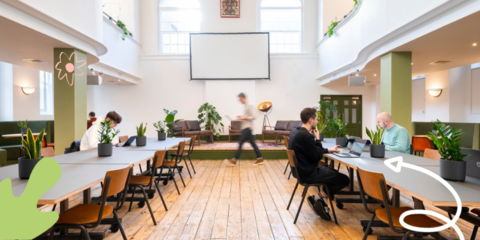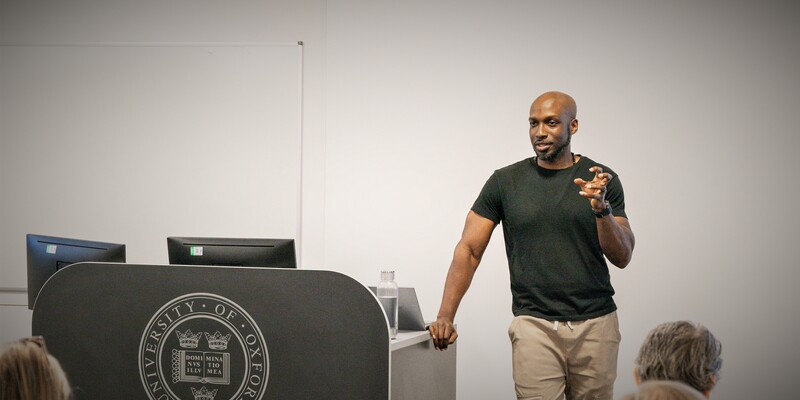Why I can’t focus at work (and 10 proven ways to fix it)

By Douglas Weissman
•
Dec 09, 2024
In today's fast-paced and cluttered attention economy, it's becoming increasingly difficult to manage busy workloads and constant distractions to focus at work. But addressing the challenges head-on can render huge benefits to both your productivity and wellbeing.
The struggle with finding focus at work
Notifications, phone calls, texts, housemates, children… these are just a few of the challenges modern workers can face when it comes to trying to focus at work. In fact, a study by the University of California, found that it takes an average of 23 minutes and 15 seconds to regain your focus after being interrupted. It may seem like a small distraction to check your text or answer an email but what may initially feel like 30 seconds or two minutes, breaks up your productivity 23 minutes at a time.
On average, nearly 85.5% of people are distracted at work, commonly disturbed by things like emails, phone calls, and the internet. Even the average worker spends 40 seconds on a single task before switching to something else. This can actually double the amount of time it takes to complete a single project and is part of the reason you can’t focus at work.
Beyond the way interruptions impact your ability to complete a task, distractions also significantly increase your stress and the number of errors you may have in the same assignment.
“If you have to keep up with everything and send emails all the time, there’s no time to reach depth. Depth connected to your work in relationships also takes time…all these things that require depth are suffering.”
Let’s take a look at some of the common causes behind why we struggle to focus at work, and some proven strategies for how to overcome distractions and find focus with ease.
Why focusing at work can be a challenge
We are conditioned to pay attention to changes in our environment and seek out pleasurable activities. For thousands of years our brains kept track of changes in our environment, alerting us to dangerous predators, potential sources of food, or places to shelter. Our instinctual habit to pay attention to distractions as a life saving tool has become a hinderance on our ability to focus in today’s attention economy.
Neuroscienstis Daniel J. Levitin says it more succinctly in his book The Organized Mind, “Our brains evolved to focus on one thing at a time.” In the days of inescapable stimulation, every distraction takes us away from our ability to perform our best within Deep Work, pushing our cognitive capabilities. Your environment has become one of constant distraction with these five common concerns attributing to your lack of focus:
1. Stress
When stress hormones flood your system they disrupt the normal functioning of neurotransmitters like acetylcholine that are involved in attention and cognitive processing. This leads to decreased mental clarity, increased distractibility, and impaired memory retention.
2. Poor work-life balance
When the boundaries between your professional and personal life blur, it can prove challenging to stay focused at work. Dopamine is a proven aid to focus, which means your emotional state will often be directly tied to your ability to concentrate. When your mental health is not at its peak, it can generate mental clutter, preoccupy your thoughts, and make it extremely challenging to attend to work-related tasks.
3. Multitasking
Contrary to popular belief, multitasking impedes your productivity. When you switch between tasks rapidly, your brain needs time to refocus and adjust, causing a loss of concentration and preventing you from fully engaging with each task. This dividing of attention results in mental fatigue, and reduces your ability to focus, which in turn can severely compromise the quality of your output.
4. Digital distractions
The constant bombardment of emails, social media notifications, and the ever present lure of doom scrolling can pull you away from your intended task and contribute to your lack of focus. The quiet ping of a notification or the burst of color from a banner disrupts your attention, resulting in a creeping “attention residue.”
5. Lack of interest or motivation
When you lack enthusiasm or motivation toward your work, procrastination can soon follow. It then becomes harder to concentrate and sustain focus. When facing unpleasant projects, the task may actually cause you pain, keeping you from taking action.
The thought of performing a task you don’t want to do can produce the same effect in your brain as the threat of pain, equal to holding your hand against a scalding coffee cup. In a 2020 study at McGill University, the average person chose pain over a difficult mental task 28% of the time.
Discover how to unlock flow states through deep work

How struggling to focus at work affects your career
The consequences of struggling with focus at work extend beyond any immediate setbacks. When facing persistent focus challenges, you may experience the following:
Reduced Productivity: The inability to maintain focus leads to decreased output, longer completion times, and missed deadlines.
Diminished Work Quality: Lack of concentration can result in errors, oversights, and lower quality work, impacting overall performance.
Missed Opportunities: Failure to stay focused may cause you to miss out on critical information, collaboration opportunities, and career advancements.
10 strategies to improve focus at work
Enhancing productivity starts with sharpening your focus. Let’s take a look at ten proven strategies designed to help with this, so that you can boost your concentration and achieve optimal work performance.
1. Time management techniques
By breaking your work tasks down into manageable stints, you can lessen the stress of work projects and stir your motivation. The Pomodoro technique is a time blocking tool that’s great for this. This method breaks work into 25-minute intervals of focused work followed by 5-minute breaks.
Time blocking in general allows you to mark out times of day to focus on specific tasks. This added structure and planning not only helps you sustain your momentum, but also helps in developing more awareness of how long tasks take so that you can build a more organized and efficient approach to your work day.
2. Mindfulness exercises
Incorporate mindfulness practices like meditation to cultivate focus, reduce stress, and enhance cognitive abilities. Systematically scan and observe different parts of your body by noticing the sensations or tension in your feet, heels, ankles, and moving upwards until reaching the top of your head.
Find a quiet and safe place to walk, either indoors or outdoors, while paying attention to your movement and breathing. Walking without distractions from technology make you more aware of your surroundings, your body’s motion, and your overall mental awareness. It can boost your mood and your energy levels in the short and long term.
The exercises help you practice concentration that you can bring back to your work. Mindfulness exercises help to train your attention, which in turn can enhance emotional regulation and promote calmer states of mind.
3. Body doubling
Find an accountability partner or use the concept of "body doubling" to create a supportive environment where you work in the presence of another person to support your ability to stay focused and gain a sense of accountability
Create a schedule, discuss whether you will work in person or virtually, and share what you intend to work on. The combination of social reinforcement, external responsibility, and sense of structure can become an effective way to improve your focus and productivity.
4. Optimize your work environment
Minimize distractions by decluttering your workspace, turning off notifications, and creating a dedicated, organized area conducive to concentration. An optimal work environment is not just where you approach work but also what encourages you to focus.
Optimizing your work environment is all about improving focus and productivity. The Science Behind FLOWN supports the importance of a sense of control in your life, whether environmental or actionable. An optimized work enviroment gives you the action of organization and cleaning, as well as providing a clear, space in which to complete your tasks. In turn, that same environment can give reduce your stress and encourage a more positive environment.
5. Digital detox
Set specific periods throughout the day to disconnect from digital distractions, enabling uninterrupted focus on critical tasks. Put your phone in a different room, take a walk without listening to music or a podcast, read a physical book or magazine.
Find a method of complete digital removal for a period of time in your day. Over time, this promotes healthy work habits, encourages alternative activities, and can restore cognitive capacities.
6. Establish Priorities
Identify the most important tasks and tackle them during periods of peak focus and energy, ensuring each task receives the attention it deserves. Accountability partners can help improve your focus by encouraging you to stick to your established priorities, leading to further personal focus and empowerment.
The proven benefits of virtual coworking with FLOWN reveal the positive changes of working with accountability partners and establishing priorities. The majority of users actively experience a boost in productivity, work quality, and focus.
7. Create a to-do list
Prepare a comprehensive list of tasks with manageable steps, providing a sense of accomplishment upon completion. The list does not need to be long and it doesn’t need to be super detailed. The to-do list is meant to help you offload mental clutter and free up brain space to effectively concentrate on the tasks at hand, in order.
Triumph over burnout with virtual coworking
My story: how to achieve flow state and beat burnout with virtual coworking

8. Productivity coaching
Seek guidance from productivity coaches who can provide personalized strategies to enhance your focus and overall efficiency.
With the right support, you can learn how to set clear goals, overcome your obstacles, and build tools to manage stress while reinforcing, and staying consistent, with the productive habits you build.
"The task of breaking a bad habit is like uprooting a powerful oak within us. The task of building a good habit is like cultivating a delicate flower.”
9. Break tasks into smaller steps
Divide larger tasks into smaller, manageable chunks, making it easier to concentrate and accomplish objectives. The enhanced clarity the simple organizational step can bring will quickly improve your problem-solving and decision making by reducing your cognitive load. In other words, you quickly overcome overwhelm with clear, actionable targets.
10. Breathwork
Breathwork is a powerful way to clear negative thoughts by tuning into your body, helping you feel at ease, and sooth lingering emotions. You can incorporate Airflow exercises to regulate stress and promote mental clarity during work hours. Proper breathing technique will also increase you health by stimulating a state of mental and physical calm.
Find focus at work for improved wellbeing and productivity
These 10 proven strategies to help improve your focus and regain control over your productivity are a guideline, but sometimes these techniques still might not be enough. To address severe focus issues that significantly impact your work and quality of life, you may need further support.
Seeking assistance is a sign of empowerment, a brave step towards reclaiming your ability to concentrate and thrive. Different methods of support can show you additional strategies, including using Fleets and Co-pilot.
Fleets allow you to join a small accountability group of like-minded people working toward similar projects and in need of additional support to sprint over the finish line. Co-Pilot gives you personalized one-on-one support with coaching and body doubling for further accountability and productivity.
With more focused encouragement, you may find underlying factors contributing to your focus challenges.
Your wellbeing and professional success are worth the investment in time and effort, so finding the support you need can give you a future where focus, productivity, and fulfillment go hand in hand.

















